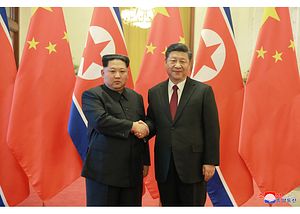Chinese President Xi Jinping sought to underline a core message with his unexpected and secretive hosting of North Korean leader Kim Jong-un on his first trip abroad since taking power after his father’s death in 2011. That message is that the long-standing friendship between Pyongyang and Beijing remains in place.
Both leaders emphasized tradition and history in statements released by their respective countries’ state media in the aftermath of their “unofficial” meeting. Kim went as far as to say that he felt an obligation to update Xi about developments in his country out of a sense of “moral responsibility”.
But there was a tacit acknowledgement, too, that all was not well.
Xi proffered Kim four proposals for the future of China-North Korea relations. The first two touched on the lack of existing high-level exchanges between the two countries. The implicit message was that Beijing felt like it had inadequate insight into Pyongyang’s decision-making.
At the very least, the summit has put an end to years of analysis pointing to the slow erosion of the historic China-North Korea relationship. This line of thinking accelerated in December 2013 when Kim decided to purge and execute his uncle, Jang Song-thaek, the man who, under Kim Jong-il, managed the economic relationship with China.
Curiously, neither side saw fit to mention the much-discussed China-North Korea Treaty of Friendship. Signed in 1961, it contains an article outlining mutual defense obligations – the only article of its kind that either country is party to.
Xi and Kim celebrated the 55th anniversary of that treaty in 2016 and Kim Jong-il, on his last trip to Beijing before he died, acknowledged the 50th anniversary with former Chinese President Hu Jintao.
Now, however, the treaty has come under question as North Korea has developed increasingly capable nuclear weapons and ballistic missiles to carry them. The word in Beijing is that China would only honor its obligations under the treaty should North Korea face external aggression. It would not finish a war that North Korea initiates, however.
Apart from what the two leaders’ meeting tells us about the state of the China-North Korea relationship, there is also the matter of the extraordinary international diplomacy surrounding North Korea.
In my last column, I underlined how Xi had largely been a player on the sidelines as South Korean President Moon Jae-in forged ahead, seizing on Kim’s New Year’s Day speech overture.
Through the course of the Winter Olympics, South Korea was the dominant intermediary between Pyongyang and Washington. In early March, this went as far as Moon’s national security adviser and intelligence chief shuttling between both capitals, carrying an invitation from Kim to Trump. China, meanwhile, was absent.
That is no longer the case. Xi has thrust himself center-stage, making clear that any process toward the denuclearization of North Korea will see China’s participation as a major stakeholder. Xi will travel to Pyongyang on Kim’s invitation, too.
China has also been in contact with the Trump administration. Xi personally briefed Trump after Kim’s visit, with the US president remarking on Twitter that Xi assured him Kim was looking forward to meeting him.
But Trump must remember that China’s strategic interests on the peninsula hew closer to Pyongyang’s than to Washington’s. Xi, like Kim, would welcome the eviction of US forces from South Korea, which is what Kim has in mind when he raises the prospect of the denuclearization on the “Korean peninsula”.
Kim, with his intercontinental-range ballistic missiles credibly flight-tested and high-yield nuclear weapons in hand, now has the added leverage of Xi’s backing as he appears poised to enter two high profile summits with the leaders of the United States and South Korea.
A version of article first appeared in the South China Morning Post. It is republished here with kind permission.

































